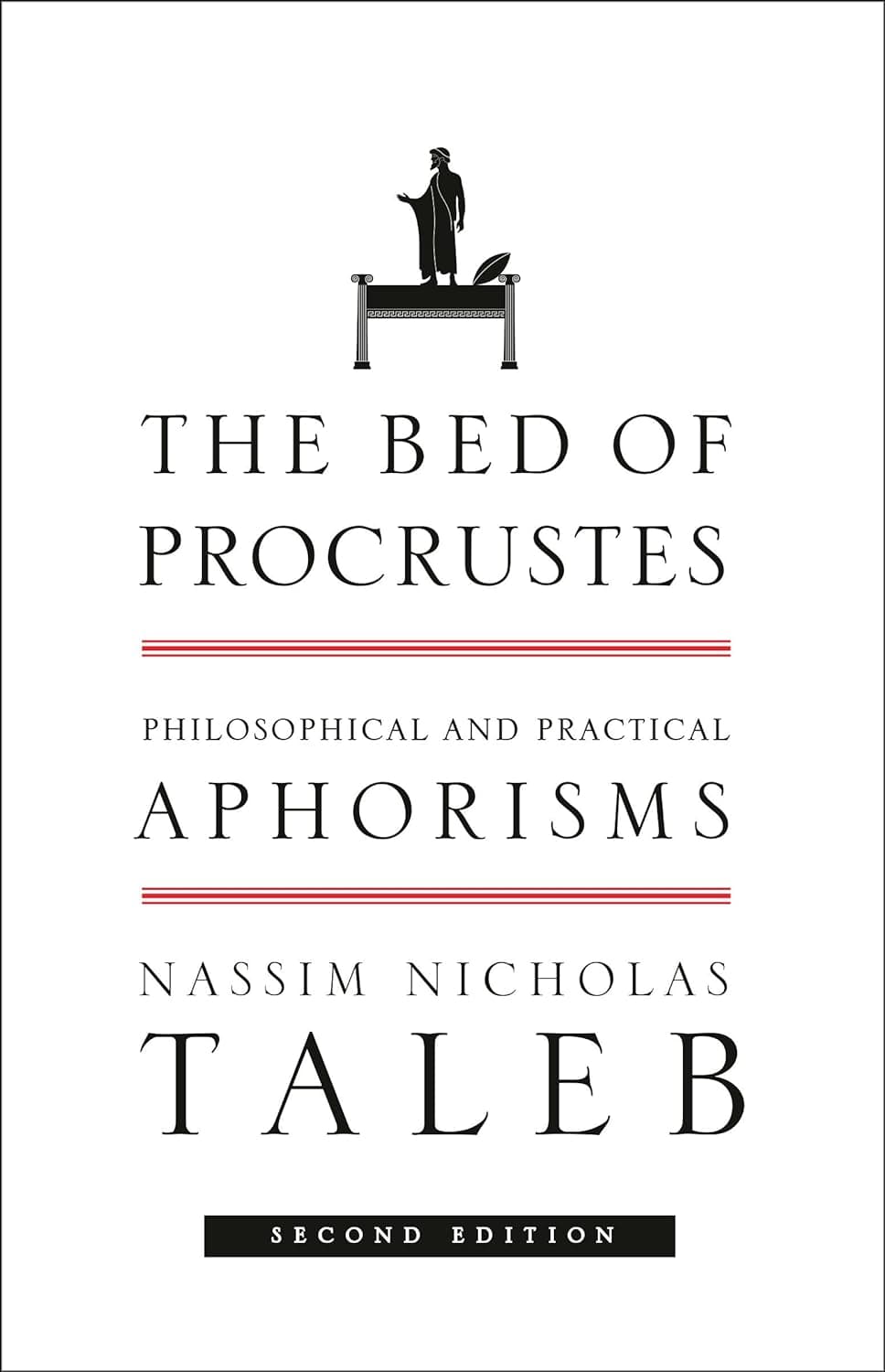
The Bed of Procrustes
By: Nassim Nicholas Taleb
Category: Philosophy
Finished:
Highlights
It wouldn’t be appropriate to summarize any of the aphorisms. As Taleb says himself:
“My best definition of a nerd: someone who asks you to explain an aphorism.”
So instead, here are some of my favorites from the book. I strongly recommend you get it yourself, as this is less than 5% of them.
“Your brain is most intelligent when you don’t instruct it on what to do— something people who take showers discover on occasion.”
“It is harder to say no when you really mean it than when you don’t.”
“The most painful moments are not those we spend with uninteresting people; rather, they are those spent with uninteresting people trying hard to be interesting.”
“If you get easily bored, it means that your BS detector is functioning properly; if you forget (some) things, it means that your mind knows how to filter; and if you feel sadness, it means that you are human.” (May be my favorite in the book)
“We need to feel a little bit lost somewhere, physically or intellectually, at least once a day.”
“You exist if and only if you are free to do things without a visible objective, with no justification and, above all, outside the dictatorship of someone else’s narrative.”
“One categorical: it is easier to fast than diet. You cannot be “slightly” kosher or halal by only eating a small portion of ham.”
“Studying the work and intellectual habits of a “genius” to learn from him is like studying the garb of a chef to emulate his cooking.”
“What fools call “wasting time” is most often the best investment.”
“You will be civilized on the day you can spend a long period doing nothing, learning nothing, and improving nothing, without feeling the slightest amount of guilt.”
“Someone who says “I am busy” is either declaring incompetence (and lack of control of his life) or trying to get rid of you.”
“Preoccupation with efficacy is the main obstacle to a poetic, noble, elegant, robust, and heroic life.”
“Those who do not think that employment is systemic slavery are either blind or employed.”
“Never hire an A student unless it is to take exams.”
“It seems that it is the most unsuccessful people who give the most advice, particularly for writing and financial matters.”
“The three most harmful addictions are heroin, carbohydrates, and a monthly salary.”
“A good book gets better on the second reading. A great book on the third. Any book not worth rereading isn’t worth reading.”
“Only in recent history has “working hard” signaled pride rather than shame for lack of talent, finesse, and, mostly, sprezzatura.”
“We are hunters; we are only truly alive in those moments when we improvise; no schedule, just small surprises and stimuli from the environment.”
“A heuristic on whether you have control of your life: can you take naps?”
“Skills that transfer: street fights, off-path hiking, seduction, broad erudition. Skills that don’t: school, games, sports, laboratory— what’s reduced and organized.”
“You exist in full if and only if your conversation (or writings) cannot be easily reconstructed with clips from other conversations.”
“A writer told me, “I didn’t get anything done today.” Answer: try to do nothing. The best way to have only good days is to not aim at getting anything done. Actually almost everything I’ve written that has survived was written when I didn’t try to get anything done.”
“Unless we manipulate our surroundings, we have as little control over what and whom we think about as we do over the muscles of our hearts.”
“It is very difficult to argue with salaried people that the simple can be important and the important can be simple.”
“The tragedy is that much of what you think is random is in your control and, what’s worse, the opposite.”
“Journalists cannot grasp that what is interesting is not necessarily important; most cannot even grasp that what is sensational is not necessarily interesting.”
“Wit seduces by signaling intelligence without nerdiness.”
“Supposedly, if you are uncompromising or intolerant with BS you lose friends. But you will also make friends, better friends.”
“Never take advice from a salesman, or any advice that benefits the advice giver.”
“General principle: the solutions (on balance) need to be simpler than the problems.”
“Robust is when you care more about the few who like your work than the multitude who dislike it (artists); fragile when you care more about the few who dislike your work than the multitude who like it (politicians).”
“They agree that chess training only improves chess skills but disagree that classroom training (almost) only improves classroom skills.”
“I suspect that IQ, SAT, and school grades are tests designed by nerds so they can get high scores in order to call each other intelligent.”
“Domain dependence is when one acts in a certain way in an environment (say, the gym) and a different way in another.”
“Change your anchor to what did not happen rather than what did happen.”
“Happiness: we don’t know what it means, how to measure it, or how to reach it, but we know extremely well how to avoid unhappiness.”
“To become a philosopher, start by walking very slowly.”
“To be a philosopher is to know through long walks, by reasoning, and reasoning only, a priori, what others can only potentially learn from their mistakes, crises, accidents, and bankruptcies— that is, a posteriori.”
“A mathematician starts with a problem and creates a solution; a consultant starts by offering a “solution” and creates a problem.”
“Being an entrepreneur is an existential not just a financial thing.”
“Bring the good news in trickles, the bad news in lumps.”
“The only definition of an alpha male: if you try to be an alpha male, you will never be one.”
“Injuries done to us by others tend to be acute; the self-inflicted ones tend to be chronic.”

